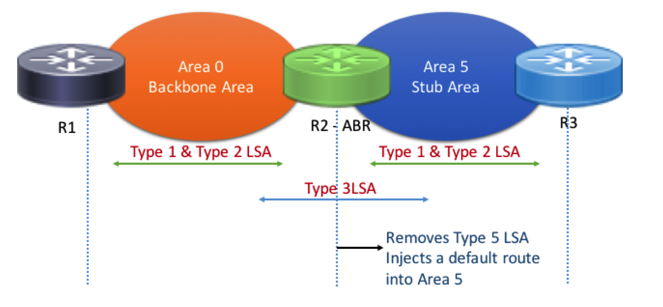We all know OSPF as routing protocol is one of the most widely used IGP protocol, OSPF happens to be the most scalable IGP protocol. OSPF also happens to be one of the complex protocols as it deals with various concepts and terminologies. One such a topic where people get confused is OSPF Area types.
I will try to simplify them and present them in an easy language, I am not going to reinvent the wheel, as one can find plenty of resources for OSPF.
What is a OSPF Stub Area ?
OSPF Stub Area basically filters out information of an OSPF database purely based on the LSA types, Basically, an ABR in a Stub Area prevents LSA type 5 to be flooded into a Stub Area, it removes Type 5 LSA and replaces them with a default route which is a Type 3 LSA. To simplify ABR creates a default route using LSA 3, listing a 0.0.0.0 with a subnet mask 0.0.0.0 and flood the same into the stub area. By using Stub Area feature one can reduce the CPU utilization of a Router.

From the above scenario, we can see Type 3 LSA is exchanged between Area 0 and 5, however, when a Type 5 LSA reaches R2 which is an ABR, it will strip External LSAs (Type 5 LSAs) and replace them with a default route towards the Router R3.
OSPF Stub Area is configured in Cisco Routers using an IOS command
router ospf 1
area 5 stub
In the upcoming post, let’s see how to configure OSPF stub area in Cisco Routers, we will build a sample topology using Cisco VIRL.
